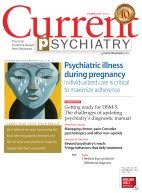Monday, June 7, 2010
Lowering Alzheimer's risk
Nazem Bassil, MD, Fellow, Division of geriatric psychiatry, St. Louis University School of Medicine, St. Louis, MO
George T. Grossberg, MD, Samuel W. Fordyce Professor, Department of neurology and psychiatry, St. Louis University School of Medicine, St. Louis, MO
Pharmacologic treatments for Alzheimer’s disease (AD) may improve symptoms but have not been shown to prevent AD onset. Primary prevention therefore remains the goal. Although preventing AD by managing risk factors such as age or genetics is beyond our control, we can do something about other factors.
This article summarizes the findings of many studies that address AD prevention and includes an online-only bibliography for readers seeking an in-depth review. The evidence does not support a firm recommendation for any specific form of primary prevention and has revealed hazards associated with estrogen therapy and nonsteroidal anti-inflammatory drugs. Most important, it suggests that you could reduce your patients’ risk of developing AD by routinely supporting their mental, physical, and social health.
Read full text (free access)
Comment on this article
Email the editor
Impaired physicians
Robert P. Bright, MD, Instructor of psychiatry, Department of psychiatry and psychology, Mayo Clinic, Scottsdale, AZ
Lois Krahn, MD, Professor of psychiatry, Department of psychiatry and psychology, Mayo Clinic, Scottsdale, AZ
As physicians, recognizing impairment in our colleagues or ourselves can be difficult. The American Medical Association defines an impaired physician as one who is unable to fulfill personal or professional responsibilities because of psychiatric illness, alcoholism, or drug dependence. Impairment is present when a physician is unable to perform in a manner that conforms to acceptable standards of practice, exhibits serious flaws in judgment, and provides incompetent care.
Recognizing when a physician is impaired, deciding whether to report him or her to the state medical board, and referring a colleague for treatment can be challenging. This article will:
- review substance abuse, cognitive decline, and other causes of impairment
- address legal and ethical issues involved in reporting a colleague to the state medical board
- provide resources for physician treatment and assistance.
Comment on this article
Email the editor
A psychiatrist/lawyer crossfire
 Henry A. Nasrallah, MD
Henry A. Nasrallah, MDEditor-in-Chief
Do lawyers understand psychiatry? To answer that semi-rhetorical question, I imagined the following conversation between 2 friends, Barry the barrister and Harry the psychiatrist.
Barry: Harry, I think psychiatry is a politically incorrect discipline.
Harry: How so, my dear friend?
Barry: Well, psychiatrists hospitalize people against their will, strip them of their civil liberties, and force them to take powerful, mind-altering drugs.
Harry: Barry, when you think about it objectively, involuntary hospitalization is a compassionate and legal act for people suffering from a brain disease that makes them suicidal or homicidal and a danger to themselves and others with no insight that they are sick. Once treated and improved, patients regain their civil liberties and often thank us for providing care against their will. And a person needs a healthy brain to properly exercise one’s civil liberties.
Subscribe to:
Posts (Atom)

